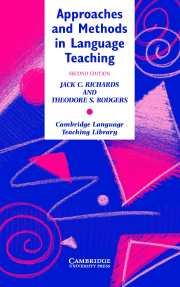Book contents
- Frontmatter
- Contents
- Preface
- Part I Major language trends in twentieth-century language teaching
- Part II Alternative approaches and methods
- 5 Total Physical Response
- 6 The Silent Way
- 7 Community Language Learning
- 8 Suggestopedia
- 9 Whole Language
- 10 Multiple Intelligences
- 11 Neurolinguistic Programming
- 12 The lexical approach
- 13 Competency-Based Language Teaching
- Part III Current communicative approaches
- Author index
- Subject index
10 - Multiple Intelligences
Published online by Cambridge University Press: 06 July 2010
- Frontmatter
- Contents
- Preface
- Part I Major language trends in twentieth-century language teaching
- Part II Alternative approaches and methods
- 5 Total Physical Response
- 6 The Silent Way
- 7 Community Language Learning
- 8 Suggestopedia
- 9 Whole Language
- 10 Multiple Intelligences
- 11 Neurolinguistic Programming
- 12 The lexical approach
- 13 Competency-Based Language Teaching
- Part III Current communicative approaches
- Author index
- Subject index
Summary
Background
Multiple Intelligences (MI) refers to a learner-based philosophy that characterizes human intelligence as having multiple dimensions that must be acknowledged and developed in education. Traditional IQ or intelligence tests are based on a test called the Stanford-Binet, founded on the idea that intelligence is a single, unchanged, inborn capacity. However, traditional IQ tests, while still given to most schoolchildren, are increasingly being challenged by the MI movement. MI is based on the work of Howard Gardner of the Harvard Graduate School of Education (Gardner 1993). Gardner notes that traditional IQ tests measure only logic and language, yet the brain has other equally important types of intelligence. Gardner argues that all humans have these intelligences, but people differ in the strengths and combinations of intelligences. He believes that all of them can be enhanced through training and practice. MI thus belongs to a group of instructional perspectives that focus on differences between learners and the need to recognize learner differences in teaching. Learners are viewed as possessing individual learning styles, preferences, or intelligences. Pedagogy is most successful when these learner differences are acknowledged, analyzed for particular groups of learners, and accommodated in teaching. In both general education and language teaching, a focus on individual differences has been a recurring theme in the last 30 or so years, as seen in such movements or approaches as Individualized Instruction, Autonomous Learning, Learner Training, and Learner Strategies. The Multiple Intelligences model shares a number of commonalities with these earlier proposals.
Information
- Type
- Chapter
- Information
- Approaches and Methods in Language Teaching , pp. 115 - 124Publisher: Cambridge University PressPrint publication year: 2001
